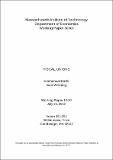| dc.contributor.author | Farhi, Emmanuel | |
| dc.contributor.author | Werning, Iván | |
| dc.date.accessioned | 2012-09-06T21:26:03Z | |
| dc.date.available | 2012-09-06T21:26:03Z | |
| dc.date.issued | 2012-07-31 | |
| dc.identifier.uri | http://hdl.handle.net/1721.1/72556 | |
| dc.description.abstract | We study cross-country insurance in a currency union with nominal price and wage rigidities. We provide two results that build the case for the creation of a fiscal union within a currency union. First, we show that, if financial markets are incomplete, the value of gaining access to any given level of insurance is greater for countries that are members of a currency union. Second, we show that, even if financial markets are complete, private insurance is inefficiently low. A role emerges for government intervention in macro insurance to both guarantee its existence and to influence its operation. The efficient insurance arrangement can be implemented by contingent transfers within a fiscal union. The benefits of such a fiscal union are larger, the bigger the asymmetric shocks affecting the members of the currency union, the more persistent these shocks, and the less open the member economies. | en_US |
| dc.publisher | Cambridge, MA: Department of Economics, Massachusetts Institute of Technology | en_US |
| dc.relation.ispartofseries | Working Paper, Massachusetts Institute of Technology, Dept. of Economics;12-20 | |
| dc.rights | An error occurred on the license name. | en |
| dc.rights.uri | An error occurred getting the license - uri. | en |
| dc.subject | Fiscal union | en_US |
| dc.subject | optimal currency area | en_US |
| dc.subject | international insurance | en_US |
| dc.subject | fiscal and monetary policy | en_US |
| dc.subject | monetary union | en_US |
| dc.subject | currency union | en_US |
| dc.title | Fiscal Unions | en_US |
| dc.type | Working Paper | en_US |
